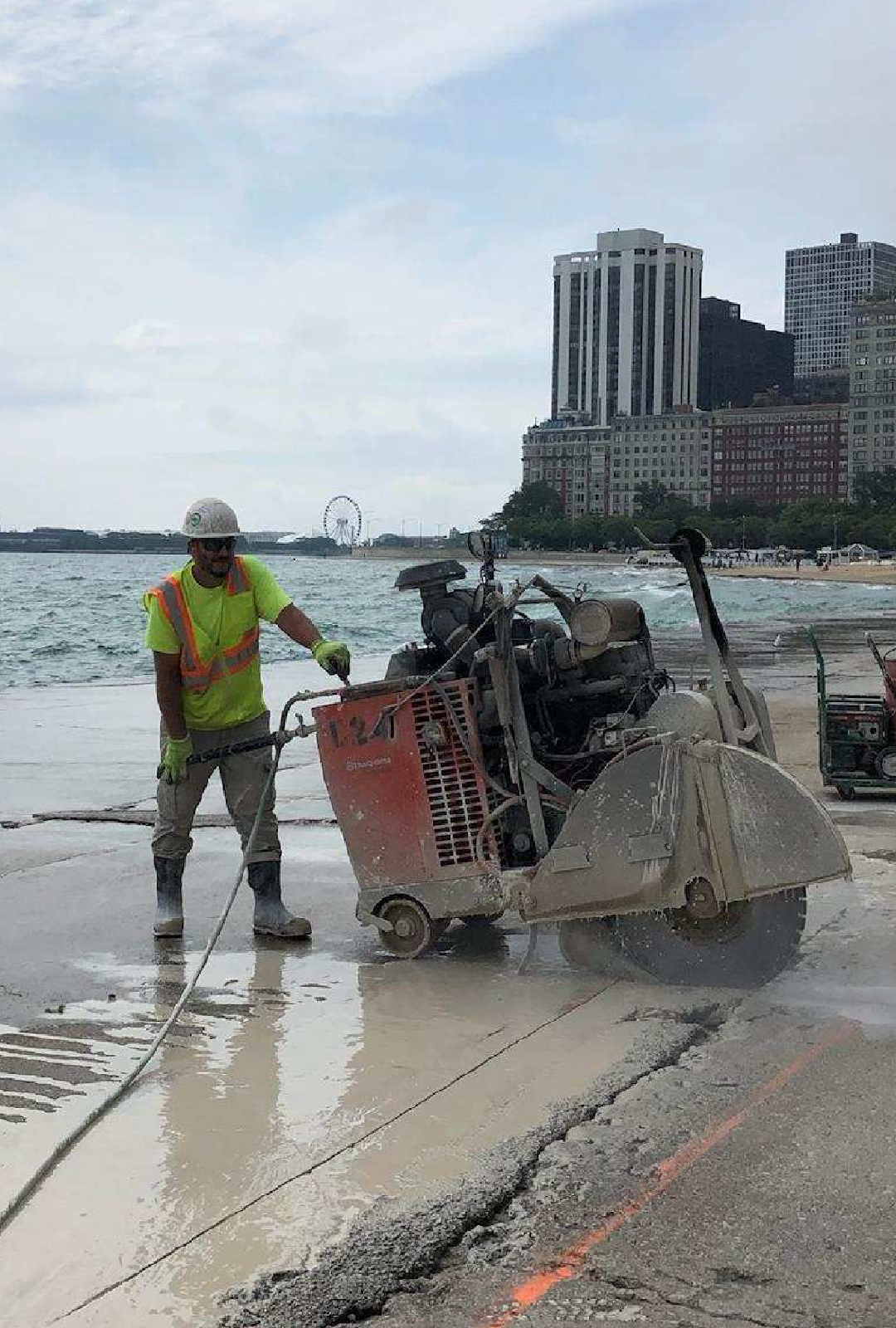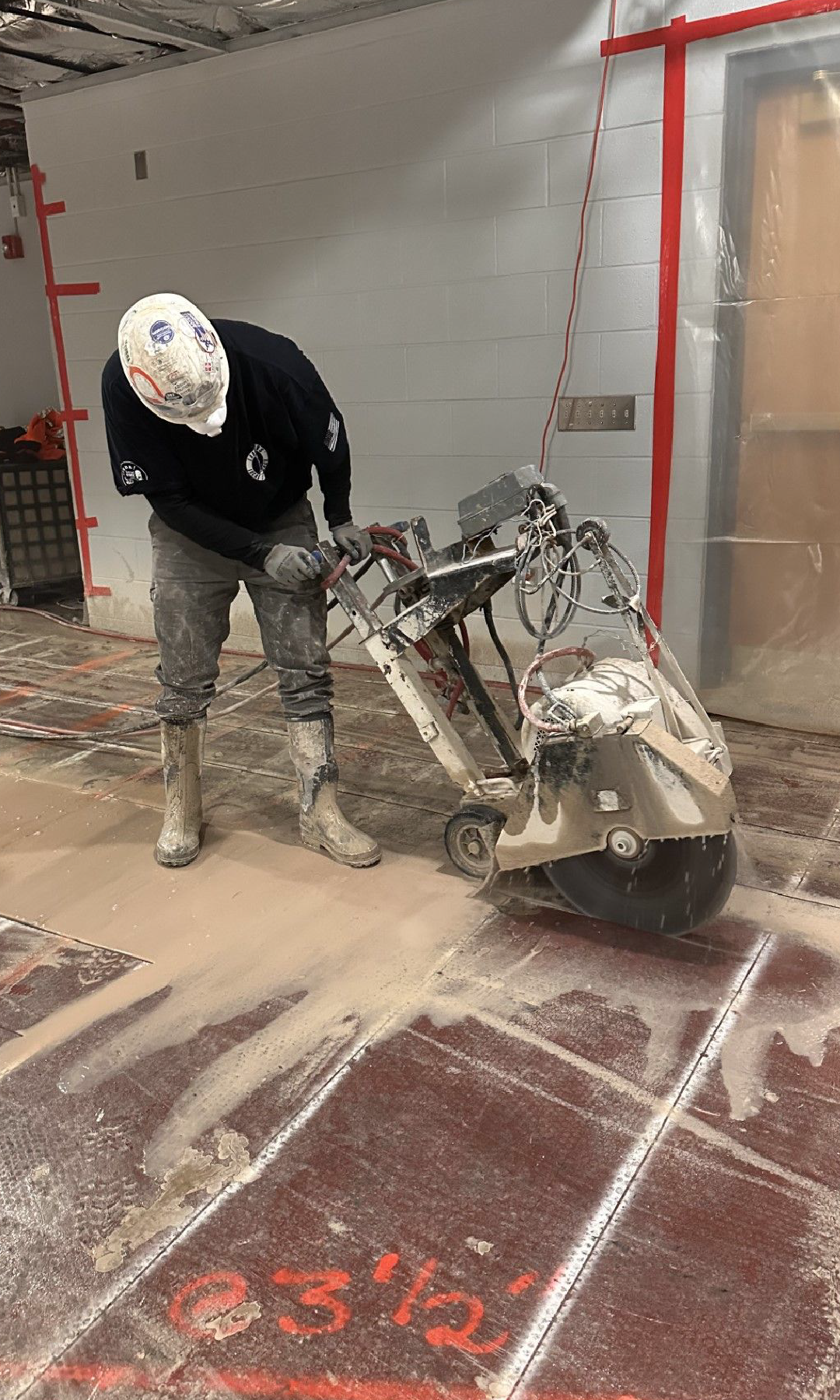Concrete Cutting & Coring
Concrete slab sawing Services
Slab Sawing overview
Concrete flat sawing, also known as slab sawing or floor sawing, is a method used to cut horizontal flat surfaces of concrete, such as floors, pavements, and bridge decks. It is commonly used in construction, renovation, and repair projects to create expansion joints, remove damaged sections of concrete, or create openings for utility installations.
Concrete flat sawing involves using a specialized saw, known as a flat saw or slab saw, which is equipped with a diamond blade. The flat saw is typically powered by a gasoline, diesel, or electric engine and is operated by a trained professional. Water is used during the cutting process to cool the blade and reduce dust. The flat saw is guided along the surface of the concrete, cutting through the material to the desired depth.
The depth of the cut can be adjusted to meet the specific requirements of the project. The diamond blade on the flat saw is capable of cutting through thick concrete slabs, as well as other materials like asphalt or reinforced concrete.
Concrete flat sawing is a precise and efficient method for cutting through horizontal concrete surfaces. It allows for controlled and accurate cuts, with minimal damage to the surrounding structure. The resulting cuts are clean and straight, making it easier to install new concrete or repair damaged sections.


slab sawing Applications
Concrete flat sawing, also known as slab sawing, is a versatile technique used in various applications across different industries. Some common applications for concrete flat sawing include:
-
Control Joint Installation
The primary purpose of "Green Sawing" is to control where the concrete cracks. Control joints need to be cut withing the first 6-24 hours to ensure the cracks in the concrete form in the desired location.
-
Utility Installation
When new public and private utilities need to be installed, or existing utilities require repair, a flat saw is used to free the existing pavement to be removed before excavation.
-
Removal of Damaged Sections
Concrete/Asphalt Patching involves removing damaged sections of pavement to help reduce the risk of further damage to the slab.
-
Expansion Joint Creation
To minimize concrete and asphalt damage when expansion is occurring, the pavement is saw cut to relieve the pressure.
-
Asphalt and Concrete Roadwork
When concrete and asphalt needs to be replaced, many times it will be saw cut to preserve structure that will be remaining.
-
Slab Removal
Flat sawing is employed to remove concrete slabs from existing structures, such as floors, pavements, and bridges, for renovation or replacement.
-
Residential and Commercial Construction
Contractors use flat saws to create openings in concrete walls or floors for doors, windows, HVAC ducts, and plumbing installations in both residential and commercial buildings.
-
Runway and Airport Maintenance
Flat sawing is essential for runway maintenance at airports, allowing for the repair and replacement of damaged sections.
-
Decorative Concrete
In the realm of decorative concrete, flat sawing is used to create intricate patterns, designs, and shapes for artistic and architectural purposes.
-
Demolition and Removal
In demolition projects, flat saws are used to cut concrete structures into manageable sections for removal, recycling, or disposal.
Overall, concrete flat sawing is a critical technique in the construction and maintenance of infrastructure, ensuring the efficient and precise cutting of concrete surfaces to meet a wide range of project needs.
Service Specs:
Depth
1/2" to 36" deep
Type of Cut
Straight Cut
Materials Cut
Concrete, Rebar
Powered By
Diesel, 480V Electric, 208V Electric
Dust control method
Water
Best For:
Large areas, buildings, warehouses and basements
Receive a FREE Quote On Your Next Job
We pride ourselves on our commitment to complete client satisfaction and safety, and we have the reputation and track record to prove it.
Why Choose Us
We revolutionize the concrete sawing & drilling industry through our innovation & attitude, provide a level of service & passion that our customers, our employees & our community desire to experience.
Safety
Cobra emphasizes the importance of safety from start to finish of every project.
Relationships
Creating successful relationships while building trust during completion of all current projects and beyond.
Innovation
Better solutions and ideas to complete projects in a more timely and efficient manner.
Scan before you saw
Scanning concrete before slab sawing is a critical step in ensuring the safety, accuracy, and efficiency of concrete cutting projects. Here are several key reasons highlighting the importance of concrete scanning:
safety
Scanning helps identify the presence of hidden objects within the concrete, such as rebar, post-tension cables, electrical conduits, or plumbing lines. Cutting into these objects without prior knowledge can lead to accidents, injuries, and damage to equipment.
accuracy
Scanning provides precise information about the location and depth of embedded objects. This information allows operators to plan the cutting path more accurately, reducing the risk of accidental damage to critical infrastructure or utilities.
cost savings
Scanning helps avoid costly mistakes and rework. By identifying potential obstacles in advance, it allows for adjustments in the cutting plan, preventing unnecessary repairs, delays, and additional expenses.
slab sawing FAQs
These FAQs should help general contractors gain a better understanding of slab sawing and its various aspects when considering it for their construction projects.
-
What is slab sawing, and when is it used in construction projects?
Slab sawing is a concrete cutting technique used to create openings or trenches in horizontal surfaces like concrete slabs. It's commonly used for various purposes, including utility installations, expansion joint creation, and demolition.
-
Why is it important to scan concrete before slab sawing?
Scanning concrete before slab sawing is crucial to identify potential obstructions like rebar, post-tension cables, or utilities, ensuring safe and accurate cutting.
-
What types of equipment are typically used for slab sawing?
Slab sawing equipment includes walk-behind or ride-on saws with diamond blades designed to cut through concrete and asphalt surfaces efficiently.
-
What depths can be achieved with slab sawing?
Slab sawing can accommodate a range of depths, from shallow scores to cuts as deep as 33 inches or more, depending on the equipment and blade used.
-
Are there specific safety precautions contractors should take when performing slab sawing?
Yes, safety measures are crucial. Contractors should wear appropriate personal protective equipment, secure the work area, and follow safety guidelines to prevent accidents and injuries.
-
How can I estimate the cost of a slab sawing project?
The cost of a slab sawing project depends on factors like the size of the area to be cut, the depth of the cut, and the complexity of the job. Contractors can provide estimates based on these details.
-
Is there a difference between wet and dry slab sawing, and when should each method be used?
Wet slab sawing uses water to control dust and cool the blade, while dry slab sawing doesn't use water. The choice depends on factors like environmental regulations and project requirements.
-
Can slab sawing be used for decorative concrete cutting, such as creating patterns or designs?
Yes, slab sawing can be employed for decorative purposes, allowing for intricate patterns and designs in concrete surfaces.
-
What measures are taken to minimize disruption during slab sawing in occupied buildings or urban areas?
Contractors can use noise-reducing equipment, work during off-peak hours, and employ dust control measures to minimize disruption to occupants and nearby businesses.
-
How long does a typical slab sawing project take to complete?
Project duration varies depending on the size and complexity of the job. Contractors can provide estimated timelines based on project specifics.
Where We Work
We provide concrete cutting & coring services across the Midwest. Don't see your city? Not to worry. Reach out to us about your job today!
Chicago, IL
Springfield, il
peoria, il
rockford, il
madison, wi
milwaukee, wi
appleton, wi
Indianapolis, in

Google Reviews
james hertz

I used to work with the owner's father for many years, trusting the company with my life. They are committed to fair pricing and completing the job on time, often ahead of schedule—more so than anything else.
Request a Quote
Thank you for your interest in our services! We pride ourselves on our commitment to complete client satisfaction and safety, and we have the reputation and track record to prove it.
Request A Quote - Slab Sawing
We will get back to you as soon as possible.
Please try again later.
90 E. Marquardt
Wheeling, IL 60090
Phone:
773-775-1111
410 E. Lafayette
Bloomington, IL 61701
Phone:
309-585-4997
601 S. 93rd St.
Milwaukee, WI 53214
Phone:
414-800-6278
1910 23rd Ave
Rockford, IL 61104
Phone:
815-227-9275
Website imagined and executed by RivalMind.
